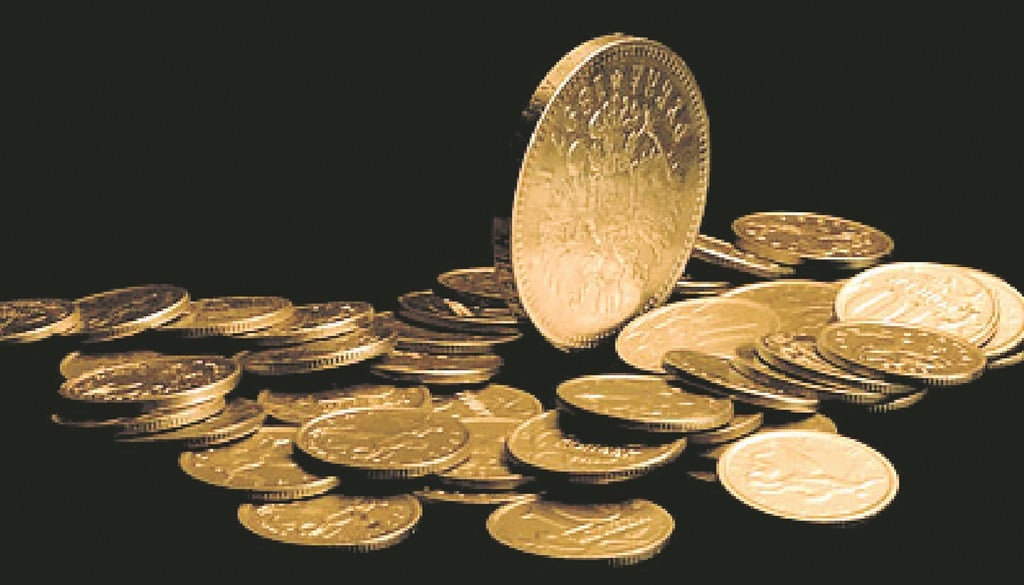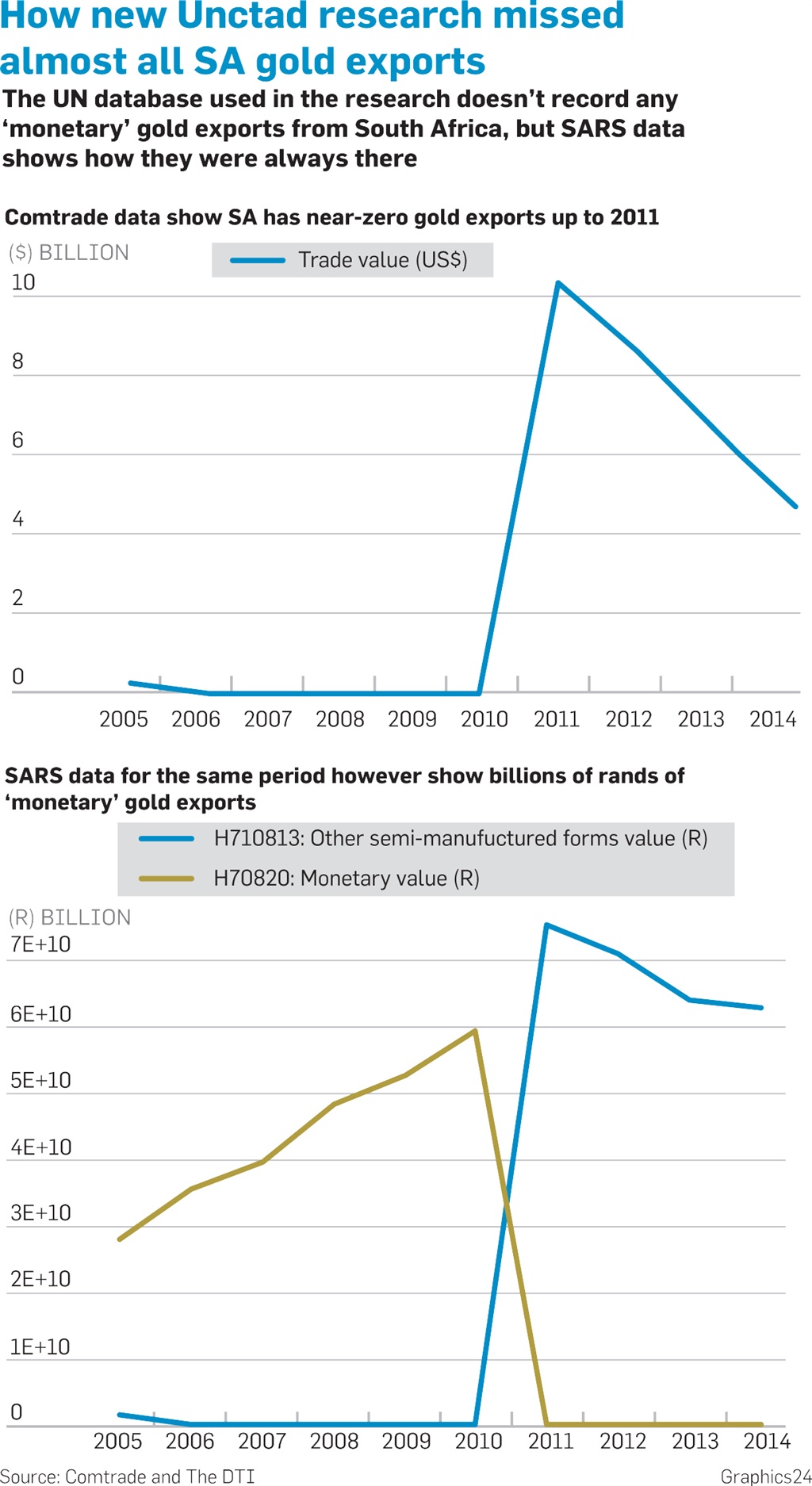
Simple statistical mistakes seemingly led one of the leading global experts on illicit financial flows to wrongly claim that billions of dollars worth of gold has been smuggled out of South Africa.
Similarly, new estimates of trade misinvoicing in the platinum sector produced by Léonce Ndikumana, a professor at the University of Massachusetts at Amherst, seem to be based almost entirely on a glitch in the UN’s Comtrade database – not actual misinvoicing.
Ndikumana is one of a handful of influential researchers into illicit financial flows producing widely cited estimates of the apparently enormous contribution to capital flight by companies that understate their exports.
The Chamber of Mines and Statistician-General Pali Lehohla have reacted with outrage to his latest report, released this month with backing and supervision from the UN Conference on Trade and Development (Unctad).
The SA Revenue Service (Sars), which is implicitly being ciritcised for not cottoning on to this enormous “smuggling”, also slammed the report in an emailed statement on Friday afternoon.
The numbers “touted” by the report are due to classifcation anomalies and easily refuted, said Sars.
“This matter was already raised with the UN statistics department way before the release of this report”, it said.
The report estimates underinvoicing of commodity exports for a handful of countries, including South Africa. It makes the shocking conclusion that almost all South African gold is smuggled out of the country.
About $113 billion (R1.6 trillion) – in 2014 terms – worth of gold was exported between 2000 and 2014 to major trading partners without being recorded, the report concludes.
It also finds significant historical misinvoicing of platinum exports to the tune of $19 billion. In both cases, the estimates are seemingly the result of basic statistical errors that City Press was able to uncover without difficulty.
The mistakes call into question some of the shocking and politically potent estimates of how pervasive trade misinvoicing is supposedly the leading contributor to illicit capital flight from Africa and South Africa in particular. The problem involves underdeclaring the value of exports to evade taxes, hence robbing countries of their rightful fiscal resources. Various estimates of how much money is involved have become the basis of global NGO campaigns and the developing world’s overall attitude towards global tax reforms.
The issue was last year given new international prominence by former president Thabo Mbeki, who led a UN high-level panel investigation into the issue using the same Comtrade database used by Ndikumana.
Going estimates put Africa’s export losses to this practice at on average $50 billion a year, which might theoretically have led to additional taxes of about $10 billion a year for the continent’s governments.
ALL SA GOLD SMUGGLED?
The Unctad report’s major claim in relation to South Africa is that “virtually all gold exported by South Africa leaves the country unreported”.
Ndikumana came up with an estimate that South Africa had suffered underinvoicing of its gold exports to its top trading partners to the tune of $113 billion between 2000 and 2014 (in 2014 dollar terms).
City Press tried to replicate Ndikumana’s result using the Comtrade database he used, while checking figures captured there for South Africa against their original source: the local customs data kept by the SA Revenue Service (Sars).
Where Comtrade says South Africa exported almost no gold at all before 2011, the official Sars statistics actually reflect billions of rands of exports (see graphic).
The reason is that most South African gold exports before 2011 were classified as “monetary” gold. The Comtrade database does not include this gold, so it simply excludes the majority of gold exports up to 2011.
The gold still shows up in partner countries’ Comtrade statistics that make it seem like it was all smuggled out.
From 2011 onwards, South African gold exports were no longer classified as monetary, so they show up in the Comtrade data.
Unfortunately, South Africa still does not officially report the destination of gold exports as with all other goods – a hangover from gold’s previous monetary role.
Receiving countries, however, report that their gold came from South Africa, so when you look at individual trade relationships, it still looks like all South African gold exports are illicit.
Ndikumana concludes that gold “underinvoicing is pervasive both over time and over trading partners”.
According to SARS, the report not only suffers from classifcation problems, but also double counting of exports which are only refined in South Africa. Local data doesn’t count this, but trading partners’ data very well could.
Unctad spokesperson Edward Harris promised to give City Press a detailed response by Friday, but failed to do so by the time of going to print.
“In brief, though, our paper identifies certain patterns that hold true for different countries and commodities over significant periods of time,” he said via email.
“The paper highlights the need for more transparency in the trade of commodities,” said Harris.
PLATINUM
The Unctad paper’s estimate of platinum underinvoicing has a similar problem.
The Comtrade database has no record of South Africa’s platinum exports in 2000 and 2002. These years’ exports do reflect as imports for other countries, causing the same problem.
Sars numbers show that platinum exports in the two years were pretty much the same as in adjoining years 2001 and 2003.
Ndikumana nevertheless attributes several billions of dollars worth of underinvoicing to these two years, making up the bulk of his $19 billion estimate for platinum underinvoincing.
BIG DATA
There are two main global trade databases that have been used to produce estimates of illicit financial flows through misinvoicing.
One belongs to the International Monetary Fund and the other one is Unctad’s Comtrade, which Ndikumana used. The IMF data only give totals and can’t show you specific products. Comtrade shows all products, but has obvious blind spots.
Mbeki’s high-level panel on the subject also used the Comtrade database for its hard-hitting report on illicit financial flows last year – possibly causing it to include the same errors that Ndikumana made.
What do you think of the Unctad report?
SMS us on 35697 using the keyword GOLD and tell us what you think. Please include your name and province. SMSes cost R1.50




 Publications
Publications
 Partners
Partners









